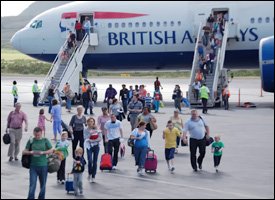
British Passengers Arriving in St. Kitts
Photo By Erasmus Williams
Basseterre, St. Kitts – Nevis
November 10, 2010 (CUOPM)
More details have emerged on an analysis of how the Air Passenger Duty (APD) is affecting Caribbean economies and recommendations for change from the Report presented to the British Government by Caribbean Tourism Organisation (CTO) Chairman Sen. the Hon. Richard Skerritt, who is also the Minister of Tourism of St Kitts and Nevis.
The Barbados-based CTO has proposed reforming the controversial air passenger duty imposed by Britain by charging one rate for flights within Europe and another for long-haul journeys. Before November 1, each economy class traveller to the Caribbean paid £50 (US$77) in APD, but that tax was increased to £75 (US $115) – the second in as many years. The levy for premium economy, business and first class passengers rose from £100 (US$154) to £150 (US$291).
The APD report, The Impact of Air Passenger Duty and Possible Alternatives for the Caribbean” has been compiled by the CTO at the request of the British Treasury in follow up to a delegation of six Caribbean tourism ministers who visited London in September.
Tourism ministers from Antigua and Barbuda, Barbados, Grenada, Jamaica, St. Kitts and Nevis and St. Lucia met with British Ministers at that time to protest against the tax that has been described as “a disgrace” by British Airways Chairman Willie Walsh.
The report highlights the negative impact on Caribbean tourism and proposes a new approach to the banding structure that would divide the world into two zones, creating a more equitable relationship between the distance travelled and the taxation of emissions.
“The APD tax is clearly a barrier to travel and tourism and we are not happy about any aspect of it. However, during our visit in September the British Government asked us to provide evidence of the impact of this tax on our tourism and to suggest an alternative approach. which would be revenue neutral,” said Skerritt.
“Our report clearly demonstrates that British visitors to the Caribbean from the UK are declining, while those from other countries have been increasing. The UK is the only major source market to have registered a decline in visitors to the region in the first quarter of 2010. We then looked at alternatives to the current tax bands and were shocked to realise how unbalanced the current banding system has become.
“This tax is discriminating against long-haul travel. It’s also hugely unfair because it penalises destinations where there is no alternative to aviation travel. If you tax flights to France from the UK, passengers can choose to reach their destination by ferry, car or rail.
“The Caribbean doesn’t have that luxury. The tax is damaging thousands of people’s livelihoods in countries around the world and the British Government needs to do something immediately. We’re now urging them to consider a simple re-banding of the whole process,” the CTO chairman.
CTO Secretary General Hugh Riley said “many countries around the world are now concerned about the impact of such heavy taxation on tourism which generates such economic benefit.
“We are proposing a revenue neutral way to change the tax bands so the British government can still collect revenues but not at the sake of damaging many fragile and tourism dependent countries around the world.”
The CTO statement said that the new recommendation “would be simple two-tier tax band with each band structured so that tax is charged in proportion to its Co2 impact. This would mean taxing short-haul flights in coach by an additional pound and in other classes by slightly more.
The CTO report, which has been sent to the ministries of tourism, the treasury and transportation, highlights that if the official January to March 2010 figures are used as a sample, if all economy destinations from bands C to D were moved into band B, the lost revenue would be £11.44 million (US$18.48 million), using 1 November APD rates.
However by increasing the APD economy rate for band A by just one pound, the increased revenue for band A economy short haul travellers would be £14.22 million (US$22.97 million), the CTO said.